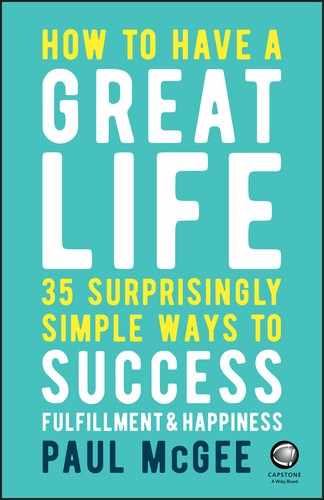Chapter 26
Don't Wait for Somebody's Funeral
It was a bizarre experience as I lay on the operating table and the surgeon walked into the theatre and greeted me. His attempt at small talk and putting me at ease was as follows:
‘I understand you're a motivational speaker.’
‘Yes, that's one label people like to give me’, I replied.
‘Well I could certainly do with a bit of motivation’, he said, without a hint of a smile.
I suddenly felt an overwhelming desire to get up and run, and my anxiety levels, which were already high, increased tenfold.
I wondered what he would have said if I worked as a funeral director. Perhaps some joke about coffins? The mind boggles.
I do wonder how much of a conversation stopper it must be when you say you work in the funeral industry. Death is not a topic many of us like to talk about generally. However, as I approach my mid-fifties, going to funerals has become more commonplace for me than weddings.
I've been to several in the last few years. Some have left me feeling completely devastated, and I've even helped carry the coffin on a few occasions.
Now although funerals can differ greatly from each other, there's usually a point during the ceremony when someone will say something about the deceased.
When my friend and colleague Vicky died, nine people spoke at her funeral, including her children. It was an incredibly emotional and moving time, which also included moments of laughter.
Other eulogies I've heard have been extremely brief, and on occasions even delivered by someone who didn't know the person they were talking about.
But there's something they all have in common.
They are not used as opportunities to criticize or settle scores with the deceased (well, not in my experience anyway) but rather as a time to recall some more positive memories about them.
I've yet to hear anyone say, ‘To be honest, I couldn't stand the bloke’ or ‘I'd like to think of something positive to say about her, but my parents told me never to lie.’
Hey, even if we didn't particularly like the person we're talking about, we usually hold back on the criticism and emphasize the positives.
Or is that just me?
But here's an interesting point made by the author Eric Barker:
I think he's got a point. Why wait for somebody's funeral before we say how much we appreciate them, or what we value about them as a person?
In recent years, as I become older and the reality of people's mortality becomes more apparent, I've begun to consciously let people know that I value them.
Now don't get me wrong. I don't call round to their house unannounced in a hearse armed with a large wreath and read out a 14-page eulogy (that didn't go down well the first time), but I am more likely to send them an encouraging text, write them a card, or mention something in conversation.
Yes, I'm mindful that some people can find this a little embarrassing, or even unusual – which is why a card, email, or text might be easier than saying something face to face. But no one has ever appeared upset or ungrateful.
I will always treasure the card my late friend Vicky sent me for my 50th birthday in which she expressed her gratitude for our friendship and was incredibly encouraging about the work I was doing.
Sadly, she wasn't around for my 51st.
But I know how I feel when I re-read her words, and I don't think I'm unusual in doing so.
I've even started to encourage and thank people I hardly know.
When my son was 15 he decided he wanted to become a doctor. The strange thing was that up until that point he hadn't liked biology (which I thought could be a pretty useful subject if you wanted to become a doctor).
But then something happened.
He got a new teacher, Mrs Shaw.
Her passion for the subject inspired him, and several years later my son is now a doctor.
I actually speak about Mrs Shaw in some of my talks. I use her as an example of the fact that one person can be MAD – Making A Difference. But it occurred to me that, despite singing Mrs Shaw's praises for several years, I had never met her or thanked her personally for the impact she'd made on my son.
So, I sent her a card.
I wrote a few words expressing my gratitude and how she had been the catalyst for my son wanting to become a doctor. I told her she was MAD, and I explained what the acronym meant. In all honesty I didn't expect to hear back from Mrs Shaw.
But I did.
She mentioned how grateful she was to hear from me and to discover what Matt was now doing. Her final words made a deep impression on me:
‘Your card just made my year.’
Wow. We had never even met. We still haven't.
But I'm glad she heard those words of encouragement whilst she's still teaching. Who knows the impact they had, and perhaps still have, on her.
You see, Mrs Shaw is like all of us.
So, remember, people are not always aware what's going on inside your head. They might not fully appreciate how much you value them.
But you can change that.
How you do that is up to you, just make sure you do it with sincerity and not with an expectation that you’ll receive anything in return. That's not the point of the exercise.
Trust me, not only will you make a difference to them but to yourself also. The reality is, we feel good when we make others feel good. And that's yet another essential ingredient in helping us live a great life.
So, don't wait for somebody's funeral.
